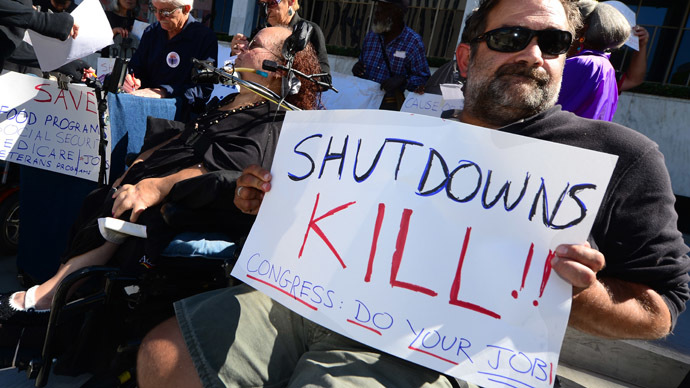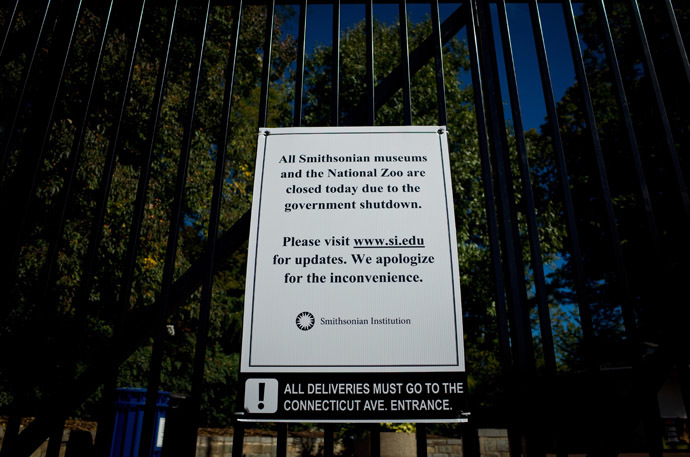American default already happened anyway

The US cannot afford to pay off its debt, and after weeks of government shutdown it has lost face, both domestically and globally. We are seeing the US defaulting both domestically and internationally, according to a group of experts interviewed by RT.
Americans rejoiced on Thursday as the Senate reached an
eleventh-hour compromise on raising the debt ceiling narrowly
averting a government default. However, a number of experts argue
that the country is already experiencing the beginning of one.
This sad forecast seems logical in the light of several factors
that include the dwindling public trust for the country and the
currency at home and abroad; the decline in foreign assets being
kept in US dollars; and America’s inability to pay off $17
trillion in debt, to name but a few reasons. One thing is for
sure – many have expressed a desire for the United States to
start living according to its means and get out of debt.
These facts consequently lead people on the international arena
to behave differently toward the United States and its currency.
This is something a panel of financial experts agreed on.
Lew Rockwell, chairman of the Ludwig von Mises Institute, said
the credit ceiling should not have been raised at all.
“I'd like to see a default, so that we have a balanced budget
that forces the government to live on its income and stop
borrowing. There's far too much borrowing by the American
government. Really everybody in the American society is too much
in debt. We need less debt, and if we want less debt the only way
we want to get these birds to do in Washington is just don't
raise the debt ceiling,” he told RT.
He argued that it’s “Keynesianism” to believe that
“more government, more spending, more debt perpetually”
are necessary to ensure everyone’s wealth. “No, it doesn’t. It
helps the banksters, it helps the government, the
military-industrial complex and all the big companies associated
with the government. It hurts the regular people, so we want an
end to the debt and… much less spending.”
“The US in fact has already defaulted, because it can’t give
back that money,” Chris Clarke, a hedge fund manager, told
RT. “We are all going to face the US default at some point in
future – in three months or in three years – but it's going to
come. If you have a heroin addict he has two choices, he can
either go through a lot of pain and sober up, or he can keel over
and die. All the US is doing is delaying the day when the pain
will come. If they don't stop pushing up the debt ceiling,
there'll be massively more pain in the future.”

While the experts disagreed on some points, they were united in
thinking that the US economy is well along the road to
defaulting. Richard Hainsworth, CEO of External Credit Ratings
Group, led the charge, saying that the dreaded default had
already happened. The US, while fulfilling its external
obligations, would not fulfill its obligations to its own
workers, Hainsworth said, adding that the US also defaulted when
“it set up certain programs that needed to be funded, and the
sequestration actually didn’t fund those laws.”
Ben Aris, editor-in-chief of Business New Europe, explained that
it doesn’t really matter what the current situation is called, as
the harm to the US’s economic stature has already been done.
“The money is a promise… itself valueless. But what America’s
done is it didn’t default insomuch as it’s going to pay its
bills. Nevertheless, it’s undermined that trust, that promise,
that they will pay… in the short term it costs nothing, because
they’re going to pay up, like they should do. But in the longer
term, they’re undermining their reputation of reliability – and
that’s going to hurt them.”
There is no enthusiasm that there will be any solution reached in
anytime soon, the experts agreed.
Clarke believes that the US will get back to the same stalemate
by February 7, the deadline by which the US will need to approve
its next hike in the debt ceiling. “The only difference will
be that the US debt will be bigger,” he said. “They'll
always get a deal; they’ll always keep kicking the can down the
road. The thing that will stop them is when people who buy US
government's debt will say ‘You know, we can see what's
going on here, we know what's going to happen,’ and they start
selling that government debt, then we'll have a problem.”
Curtis Ellis, executive director of American Jobs Alliance, told
RT: “We haven't been able to come up with a solution for two
years, so we are not going to see it in three months.”
Decline of ‘Brand America’
The fact remains that just over 60 percent of the world’s
currency exchange reserves are currently held in US dollars. But
the US debt stalemate has brought about forecasts that there’ll
be a move away from the dollar due to dwindling trust abroad.
Keith Boyfield, who is the research fellow for CBS, believes
there'll be a review of how countries worldwide hold their
assets. Larger investment will flow away from the US dollar into
other countries, namely into the UK, as investors increasingly
learn not to hold all their assets in one place. He also sees
gold and the commercial and residential sectors as prospective
targets for investment as they are a “hedge” against
uncertainty – “and markets hate uncertainty.”
“The world cannot depend on America anymore,” Francis Lun,
CEO of GEO Securities Limited, agreed.
In their panic the Chinese “are setting up currency swaps with
other countries, they’re looking for other assets in which they
can invest, they want to get rid of their dollars; they would
prefer to move to the euro,” Hainsworth told RT.

But the problem is that there's no other reserve currency except
US dollar, so the US is still in a better position, Celente said.
And so far China and other countries will be cornered with
trillions of dollars of US debt.
According to Lun, any harsh movement from the US dollar will
disrupt global markets, as at the moment there are not enough
alternatives to make it without catastrophic consequences.
However, he argues, it is time to diminish the meaning of US
dollar in global finances.
Parsons calls it the decline of “Brand America.” But in
terms of the de-Americanization that analysts seem to forecast,
he is not worried. This so-called process has been happening for
15 years, Parsons said. And while he believes that the process
“is taking place and will continue to take place,” the
next 20 years do not seem like such a bad deal for the US to stop
being majority holder of currency in the world.
Clarke said that the world was now going down the road along with
the US. “The US is not the only game in town here,” he
said.
“Japan is in an even worse situation. China is beginning to
put itself in the same situation. Europe is in that situation.
It's about time that somebody out there started to realize that
the economic model which has been the Western economic model for
the last 70 years is truly broken, and pursuing economic growth
and full employment at all costs is not a sustainable
[goal],” Clarke told RT.
The statements, views and opinions expressed in this column are solely those of the author and do not necessarily represent those of RT.












